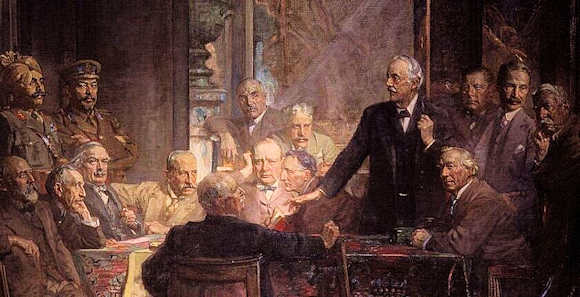 |
| Statesmen of the War Depicts Many British Leaders Involved in the Dardanelles Decision Including, Asquith, Balfour, Lloyd George, and Churchill (Kitchener Not Shown) |
Although not the only factor, wheat was apparently a major consideration for British war leaders in 1915. Wandering around the internet looking for fresh material, I sometimes come up with some little or never (by me) known aspect of the Great War that punches me right in the nose. Here's a factoid I never considered, according to author and historian Nicholas Lambert and reviewer of Lambert's newest work, The War Lords and the Gallipoli Disaster: How Globalized Trade Led Britain to Its Worst Defeat of the First World War, Pentagon official Thomas Hone, the whole Dardanlles fiasco was about wheat. From his review:
Lambert shows [in his book] how economic and social factors rooted in Britain’s global trade network shaped the decision by the British War Council (the “War Lords” of the title) to order British (joining with French) naval and land forces to capture the Dardanelles in 1915. Lambert has read the military histories of the Gallipoli campaign, but his research shows that comprehending why that campaign occurred—and occurred the way it did—requires an understanding of the role of wheat in Britain’s war strategy.
Wheat? Why did wheat—specifically, Russian wheat—play an important role in the decision to attack the Turkish defenses of the Dardanelles? Lambert answers that question by first noting that the major belligerents assumed that the war would not last long. “Home by Christmas” may have been a wish that the troops on both sides voiced in 1914, but the leaders of the warring states hoped for it as well. Great Britain, for example, did not have a process in place to guarantee that British bakers would continue to have flour on hand to make affordable bread for Britain’s population if the fighting continued into 1915. British political leaders assumed that the commerce of wheat production and distribution, coupled with the commerce of open-market bread production and sales, would feed Britain’s millions adequately. They also assumed that the tsar’s regime could supply the Russian armies with sufficient ammunition. Both assumptions turned out to be wrong, and Lambert deftly explains why.
 |
| At Gully Ravine, Helles Sector |
French’s was not the only military proposal on the table as the War Lords met at the beginning of 1915 to consider Britain’s next move in the war. Winston Churchill, the First Lord of the Admiralty, pressed his colleagues to adopt a plan to seize the Dardanelles. His argument was that doing so would not prevent the British forces in Flanders from making a major attack on the German lines in 1915. Moreover, opening the Dardanelles would knock the Ottoman Empire out of the war—thereby allowing Russian wheat to flow into world markets, preventing a price surge that Britain ill could afford.
 |
| Lone Pine Cemetery and Memorial, Anzac Sector |
Lambert makes a strong case that the War Lords went along with Churchill “primarily for political, not military, reasons.” Britain needed a victory to justify war losses already sustained; Russia needed to export its wheat so it could buy needed ammunition; British workers needed the wheat to live; and Britain needed to keep Russia in the war. Lambert observes that “[for] the most important decision-maker—the prime minister—the weight of the evidence indicates clearly that the wheat issue was paramount in his mind” (p. 267). But [wheat] did not retain that [paramount] position for Asquith. By late March 1915, after initial attempts by British and French warships to force their way through the straits had failed, Asquith and his colleagues faced a choice: back down and call off the attacks on the Turkish defenses or press on with a major amphibious assault? They chose the latter—and lived to regret it.
Source: “NEITHER KNAVES NOR FOOLS” Thomas C. Hone review of The War Lords and the Gallipoli Disaster: How Globalized Trade Led Britain to Its Worst Defeat of the First World War, U.S. Naval War College Review, Winter 2022

I am pretty sure I've seen wheat mentioned as one of the reasons before, but this is really interesting in fleshing it out.
ReplyDelete